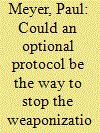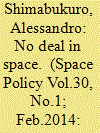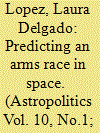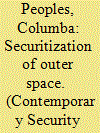|
|
|
Sort Order |
|
|
|
Items / Page
|
|
|
|
|
|
|
| Srl | Item |
| 1 |
ID:
179861


|
|
|
|
|
| Summary/Abstract |
Since the early 1980s, the United Nations General Assembly and its affiliated forum, the Conference on Disarmament in Geneva, has had the Prevention of an Arms Race in Outer Space issue on its agenda. In the intervening years, the threat of weapons being introduced into the outer space realm has waxed and waned, but, in the main, a benign environment free from man-made threats has prevailed, allowing for great strides in the exploration and use of space. Recently, a renewal of great power rivalry including the development of offensive “counter-space” capabilities has resurrected the spectre of armed conflict in space. With widespread political support for the non-weaponization of outer space, has the time come to give legal expression to this goal by means of an optional protocol to the 1967 Outer Space Treaty?
|
|
|
|
|
|
|
|
|
|
|
|
|
|
|
|
| 2 |
ID:
132563


|
|
|
|
|
| Publication |
2014.
|
| Summary/Abstract |
Space systems are essential to the global economy and security. The possibility of disruptions arising from competition between the United States and China through the testing and deployment of weapons in space has led to concerns over an incipient space arms race that would threaten satellites, leading to international calls for a space arms control treaty. The paper presents a rationalist theory analysis on the lack of progress in establishing such a treaty, identifying the United States' position of primacy in the global order and its preeminence in space as a primary cause.
|
|
|
|
|
|
|
|
|
|
|
|
|
|
|
|
| 3 |
ID:
111629


|
|
|
|
|
| Publication |
2012.
|
| Summary/Abstract |
The decision by the Obama Administration of the United States to include the consideration of space arms control measures is one of the latest wake-up calls for stakeholders in the space weaponization debate. Featuring the interplay between economic, political, and technical considerations, the outcome of this issue may depend on the political justifications and implications of the arguments proposed. This article uses international relations theory to analyze the assumptions behind the argument that the United States' placement of weapons in space would inevitably lead to an arms race in space. By examining the structural realist concept of stability and considering what such an arms race in space would entail, it concludes that this outcome is, at best, only probable, and that its continued use weakens the overall argument of anti-space weapons proponents. Addressing such problematic assumptions may prove important not only in strengthening the arguments of stakeholders on both sides of the issue, but also in enriching the debate and bridging perspectives on this highly polarized issue.
|
|
|
|
|
|
|
|
|
|
|
|
|
|
|
|
| 4 |
ID:
104997


|
|
|
|
|
| Publication |
2011.
|
| Summary/Abstract |
The concepts of militarization and weaponization dominate debates on space security, and radically different implications for arms control follow depending on which of these two characterizations is adopted. Yet the militarization-weaponization debate in many ways fails to capture the vagaries of contemporary space policy. An increasing number of international actors now argue that the infrastructure of modern society - including communications, media, and environmental monitoring - is crucially reliant upon satellite technologies. As a result it is now more accurate to say that outer space is becoming ever more securitized: that is, access to space is now commonly framed as essential to the military, economic, and environmental security of leading states and international organizations. The article illustrates the contribution of a securitization approach in this regard via an analysis of United States and European Union space policy. In the process it argues that attempts at securitization in these space policy discourses maintain an inherent tension between global and national security concerns, and thus provide a weak basis for space arms control. However, in closing the article the author makes the argument that securitization of outer space, if configured around an alternate vision of space security that moves beyond the statist foundations of traditional arms control, can potentially mobilize the political will required for controlling the means of violence in and from outer space.
|
|
|
|
|
|
|
|
|
|
|
|
|
|
|
|
|
|
|
|
|